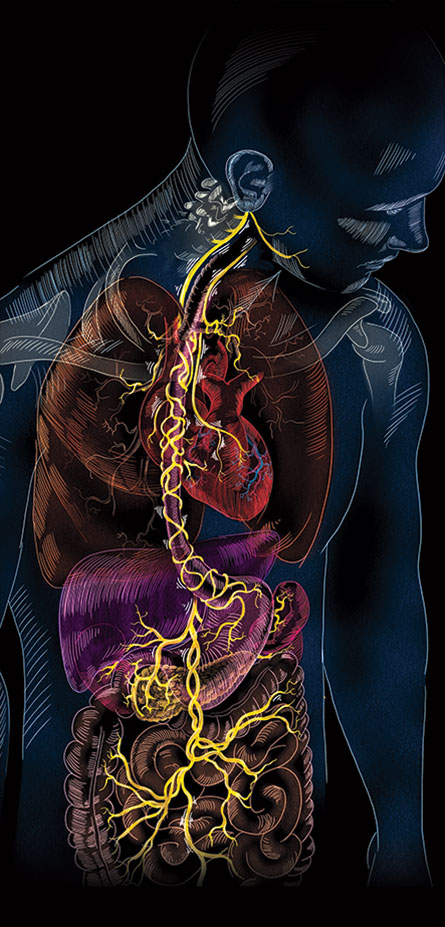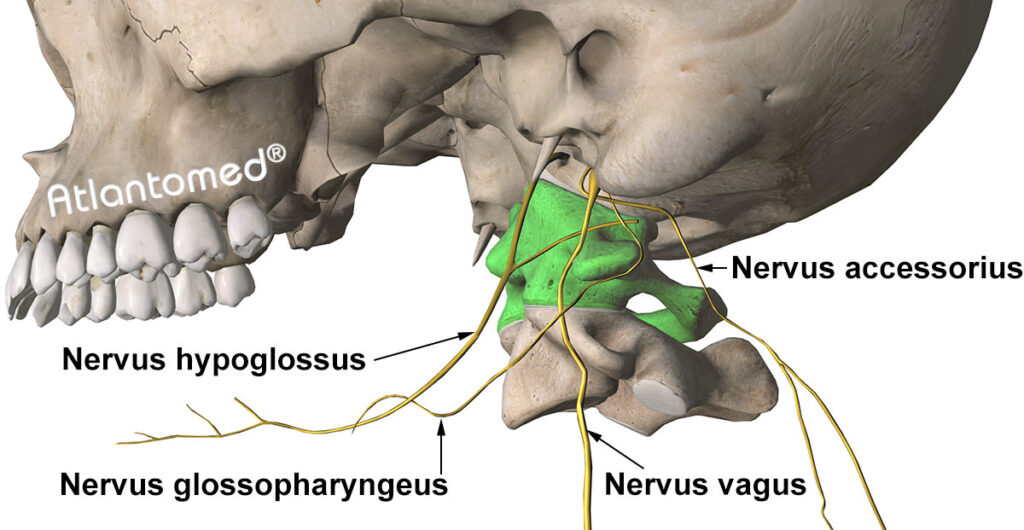Of the 12 pairs of cranial nerves that emanate from the brain, the vagus nerve is the longest and most complex. It is the bidirectional super-communicator for our brain and almost every organ in the body as well as governing the involuntary facial movements we use to recognize emotions in another human being. The figure below shows the location of the nerve (nervus vagus) at the upper cervical spine location. The green bone is called C1 or atlas, houses the nerve.
Fortunately, getting regular acupuncture has been shown to increase vagal tone and reset the nervous system, giving the body what it needs to optimize its own self healing mechanisms and stay boosted against any immune threats. This “reset” can almost feel like you are tired or “high” for a few minutes after your session. Once starting out, the effects last maybe a few days but as you continue with regular acupuncture and your nervous system re-calibrates, you will have sustained effects. Most people at this point just come in for monthly maintenance.
What are vagus nerve functions?
The four key functions of the vagus nerve are:
- Sensory: the throat, heart, lungs, and abdomen.
- Special sensory: Provides taste sensation behind the tongue.
- Motor: Innervates muscles in the neck responsible for swallowing and speech.
- Parasympathetic: Responsible for the digestive tract, respiration, and heart rate functioning.
The nervous system can be divided into two areas: sympathetic and parasympathetic. The sympathetic side is our “flight, fright, or freeze” part of the nervous system which elevates alertness, energy, blood pressure, heart rate, and breathing rate.
The vagus nerve is most heavily associated with the parasympathetic side of the nervous system, which lowers alertness, blood pressure, and heart rate, and helps with calmness, relaxation, and digestion. As a result, this nerve also helps with defecation, urination, and sexual arousal.
Other hugely important vagus nerve functions include:
- Communication between the brain and the gut: The vagus nerve delivers information from the gut to the brain.
- Relaxation with deep breathing: The vagus nerve communicates with the diaphragm. This is why deep belly -breaths can be so relaxing.
- Decreasing inflammation: The vagus nerve can send anti-inflammatory signals to other parts of the body.
- Lowering the heart rate and blood pressure: If the vagus nerve is overactive, it can lead to the heart being unable to pump enough blood around the body. In some cases, excessive vagus nerve activity can cause loss of consciousness and organ damage.
- Fear management: The vagus nerve sends information from the gut to the brain, which is linked to dealing with stress, anxiety, and fear – hence the saying, “gut feeling.” These signals help a person to recover from stressful and scary situations.

P.S. – Treating the vagus nerve may also help other inflammatory conditions such as rheumatoid arthritis, Crohn’s, Parkinson’s, and Alzheimer’s.
Rheumatoid arthritis affects 1.3 million adults in the U.S. There was a study done in 2016 that demonstrated that vagus nerve stimulation could help reduce symptoms. Individuals who had failed to respond to other treatment reported significant improvements, while no serious adverse side effects were noted.





